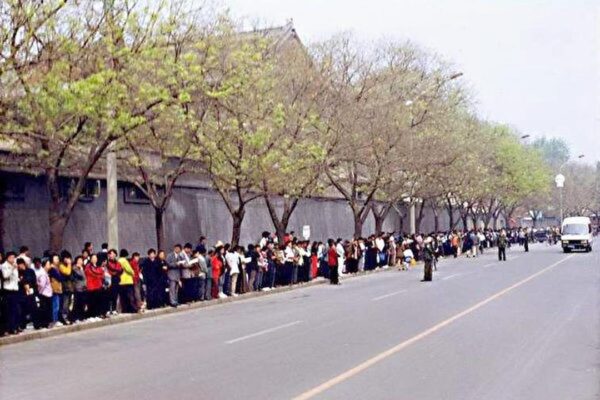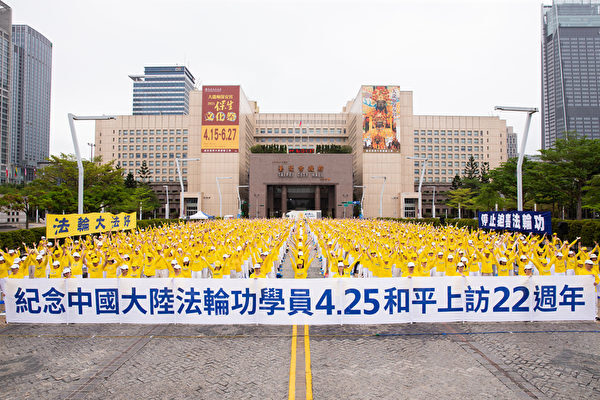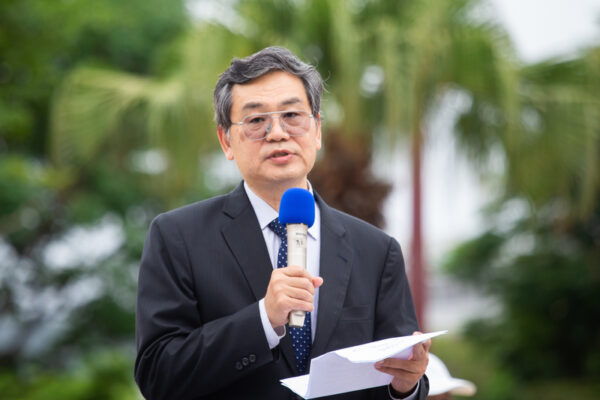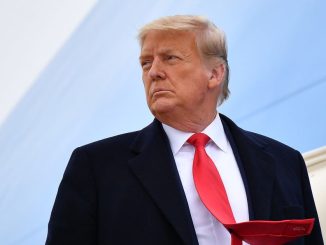
On April 25, when Liu Huiqing and three other Hong Kong Falun Gong practitioners demonstrated in front of the Liaison Office, Beijing’s representative office in Hong Kong, over ten police officers in plain clothes or uniforms and office security guards watched alertly.
They came to commemorate the 22nd anniversary of a historical appeal for freedom of belief in mainland China, but the current situation in Hong Kong—a four-person limit on public group size and the new national security law imposed by Beijing—made this year’s rally special.
“Twenty-two years have passed since tens of thousands Falun Gong practitioners peacefully appealed on April 25, 1999,” Liu Huiqing, representing the Hong Kong Falun Dafa Association, said at the front of the rally. “The Chinese Communist Party continues the persecution of Falun Gong practitioners.”
“Commemorate 22nd anniversary of the April 25 peaceful appeal,” “Stop the persecution of Falun Gong,” and “Falun Dafa is good,” read banners held by the three others.
On April 25, 1999, around 10,000 Falun Gong adherents showed up at the appeals office near Zhongnanhai, the central government compound in Beijing. They asked the authorities to release the 45 Falun Gong practitioners recently arrested in the nearby city of Tianjin and to allow Falun Gong to be practiced in China without fear or harassment.

The premier at the time, Zhu Rongji, met with three representatives and agreed to their requests.
But three months later, a nationwide, systematic persecution against the ancient the spiritual discipline was launched by Jiang Zemin, then leader of the Party. Millions of innocent people in China have since been fired from their jobs, expelled from school, jailed, tortured, or killed, simply for practicing Falun Gong.
Falun Gong, also known as Falun Dafa, consists of a sitting meditation, four gentle standing exercises, and moral teachings focused on the core values of truthfulness, compassion, and tolerance.
“Until now, the communist regime hasn’t given [Falun Gong] justice,” said Cai Yaochang, a pro-democracy activist in Hong Kong.
Although Falun Gong practitioners in mainland China are not able to hold public events, adherents overseas, and even in Hong Kong, never stop, he added. “They emphasize the principle of truthfulness, compassion, and tolerance. Their persistence deserves more attention.”
In the speech, Liu also condemned the violent attack on the local Falun Dafa information booths by vandals believed to be hired by the Chinese Communist Party (CCP). She expressed gratification for the vandals’ arrest.
Hong Kong police announced that eight men related to the crime were arrested on April 22, 2021. The arrested suspects have mafia backgrounds and their motives are still under investigation.
In April, seven Hong Kong public information booths exposing the Chinese regime’s persecution of the spiritual practice Falun Gong were vandalized, signs were destroyed, and practitioners were verbally and physically threatened.
Taiwan
A contrasting rally was held on the same day in Taiwan. Thousands gathered at the Taipei City Hall Plaza, in front of the Taipei government, and did Falun Gong exercises and held a press conference, with local officials voicing their support.

The communist regime chose violent suppression instead of listening to reasonable voices, said Tsai Chi-chang, the vice president of Taiwan’s Legislative Yuan, something not acceptable to the free world.
“I believe no one could accept it,” said Taiwan legislator Freddy Lim. For most governments, peaceful appeals like the April 25 event are common.
Taipei city councilor Lin Ying-meng said April 25 is significant because Falun Gong practitioners in China appealed to the communist regime for their fundamental right of freedom of belief.
The CCP promised to offer freedom of belief. But later in July, she continued, the Party launched the persecution campaign against Falun Gong.
“The CCP never keeps its promise,” she pointed out that the similar scenes have repeated again and again—from Falun Gong practitioners to Uyghurs, Tibetans, and Hong Kongers.
“Let’s stand together against communist tyranny and [stand] with Falun Gong practitioners,” she said.

CCP, not China
Falun Gong practitioners’ appeals are not related to politics. They only want freedom of belief, said Su Tzu-yun, a research fellow of the Institute for National Defense and Security Research in Taiwan. The communist regime had written those rights into their constitution, but the ongoing persecution reveals it is a mere scrap of paper.
“The problem is not about China. It’s the CCP,” Su called on Chinese people to wake up.
While China was hit hard by the coronavirus pandemic in 2020, the CCP continued the persecution, said Wang Chung-yue, the former director of the Rescue Falun Gong Practitioners Association. Eighty-three practitioners were persecuted to death, 622 sentenced to prison for their faith, and another 12,500 were harassed and arrested in 2020.

Falun Gong practitioners have given up during the 22 years of persecution, despite the CCP unleashing all kinds of cruel torture methods, Wang continued.
The reason is simple. Practitioners’ minds and bodies benefited by following the principle of truthfulness, compassion, and forbearance.
Liang Zhen, Wu Min-jhou, Hsu Tsui-ling, Chang Yuan-chang, Huang Yu-yan, and Hou Jyun-lin contributed to this report.






Be the first to comment